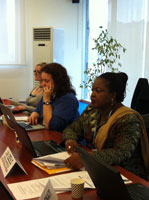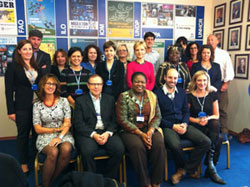Combatting trafficking in persons in global supply chains
 Trafficking in persons has emerged as a key challenge and risk in a wide range of industries and sectors integrated into global markets, such as agriculture, information and communication technology, garments and textiles.
Trafficking in persons has emerged as a key challenge and risk in a wide range of industries and sectors integrated into global markets, such as agriculture, information and communication technology, garments and textiles.
Trafficking in persons for labour exploitation is a grave violation of human rights and represents a serious risk for businesses. However, many businesses do not treat human trafficking as a priority issue and lack any specific policies or programmes to prevent it. While human trafficking and forced labour may affect every sector and every company, it is often challenging for companies to comprehend the extent of their exposure to risk. For example, risks practices in recruitment are often overlooked, including practices such as the payment of fees by jobseekers, retention of passports or the lack of transparency in the terms of the contract, deceiving workers into exploitative working conditions.
Business efforts in eliminating trafficking in persons from their supply chains
Some leaders in the private sector have taken measures to prevent risk practices, through strengthening their standards and codes of conduct and implementing due diligence measures that specifically address trafficking in persons’ risk indicators. Multi stakeholder and industry driven initiatives also play a role in supporting business’ transparency efforts and in addressing human trafficking challenges.
Work of the mandate
Through active reaching out, several consultations and follow up, the Special Rapporteur has explored challenges, lessons learnt and good practices in the establishment of strong voluntary standards systems that effectively monitor and assess businesses’ compliance.
Thematic reports
The Special Rapporteur has devoted three reports to this issue:
Most recently, in the 2019 report to the 74th session of the UN General Assembly (A/74/189), the expert focuses on workers who are victims of trafficking in persons and severe exploitation in businesses’ operations and supply chains. She identifies good practices, and defines guidelines and recommendations for implementing long-term viable remediation responses to such ill-treatment.
Strengthening voluntary standards for businesses on preventing and combating trafficking in persons and labour exploitation, especially in supply chains (A/HRC/35/37): In this 2017 report to the 35th session of the HRC, the Special Rapporteur identifies and analyses main challenges in adopting voluntary standards and assurance processes that effectively facilitate the detection of trafficking in persons. On the basis of the dialogue launched with stakeholders identified within voluntary standards initiatives, she presents recommendations to multi-stakeholder initiatives, assurance providers, companies, States and donors.
In the 2012 report to the 67th session of the UN General Assembly (A/67/261) the Special Rapporteur examines the existing international legal framework and standards applicable to States and businesses, in addition to non-binding codes of conduct and principles adopted by businesses, as part of efforts to prevent and combat human trafficking. The report also outlines a series of clear and practical recommendations for business and States to eliminate trafficking in the supply chain.

Practical guidance for businesses to combat trafficking in supply chains
The Special Rapporteur on trafficking has been working on new guidance for businesses to combat trafficking in supply chains. The guidance is scheduled to be published in late 2021.
The Special Rapporteur published in 2013 a list of indicators of human trafficking for labour exploitation to help companies and others to identify risk practices in their supply chains. See Benchmarks and indicators for ensuring trafficking-free supply chains.
Multi-stakeholder initiatives
Together with Verite, an international NGO based in the US, the Special Rapporteur launched a project in 2016 to reduce the vulnerability that workers face in supply chains and tackle trafficking in persons’ risks by strengthening multi-stakeholder and industry-based strategies. An initial meeting took place on 14 July 2016 with representatives from multi-stakeholder initiatives and industry coalitions working on tackling exploitation of workers in supply chains. The meeting objectives were:
- To learn about good practices and challenges in the implementation of human trafficking and forced labour related clauses in voluntary standards,
- To share and discuss lessons learnt in adopting due diligence measures, monitoring compliance and the establishment of grievance mechanisms,
- To discuss good practices in voluntary standards that could be extrapolated to regulatory frameworks, and
- To explore next steps that could help reinforce multi-stakeholder standards
*OHCHR is not responsible for the content of external links.